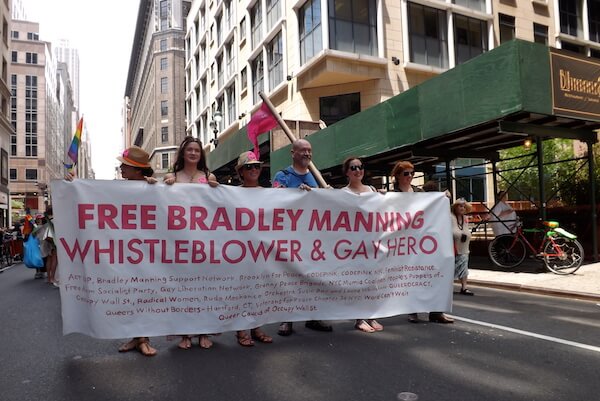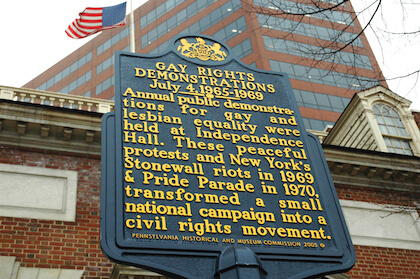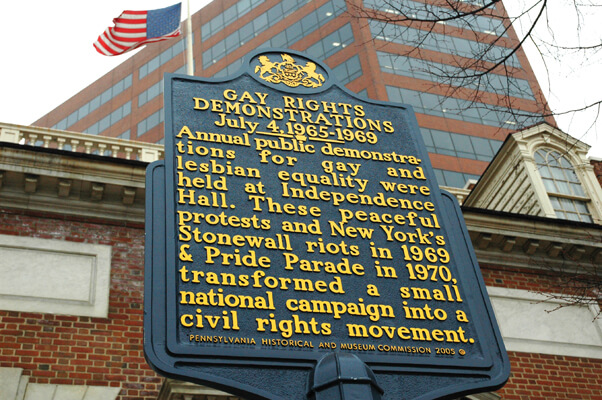Thomas Eakins' 1888 portrait of Walt Whitman.
There are many forms of censorship, and gay-themed books are constantly under attack.
One pernicious form is economic. Nothing is “free” in the mythical “free marketplace of ideas” about which we’re taught in our high school civics classes. Competition from Amazon.com and e-books has driven many independent booksellers out of business. Here in New York, we are still mourning the loss of our last two remaining gay bookstores — the legendary Oscar Wilde Bookshop, which under the leadership of its late founder, the out-before-Stonewall queer activist Craig Rodwell, played such a key role in the birth of the modern gay liberation movement, and A Different Light, another fine purveyor of gay literature. Both were driven out of business over the past decade by the failure of cost-conscious LGBT book buyers to support them.
Now, two young gay entrepreneurs are attempting to fill the void. Since November, a new bookstore and queer community space with the somewhat cumbersome name of Bureau of General Services — Queer Division has been operating out of a temporary headquarters at the Strange Loop Gallery at 27 Orchard Street, while trying to raise the modest sum of $15,000 to rent a permanent home. But this valiant effort to create a sex-positive, activist-oriented bookstore on the Oscar Wilde model will lose its temporary location at the end of January.
So, if you care about books and want to take a concrete step to fight the censorship of the marketplace, I urge you to visit their web site at bgsqd.com and make a donation while there is still time.
The other form of censorship that threatens LGBT books is the political homophobia of the fundamentalist Christian right, which is the American Taliban. Their censorship campaigns target, in particular, school libraries. When I recently ordered some quality gay novels from my favorite independent bookseller, New York’s legendary Strand Books, which stocks 15 miles worth of “used” volumes, I was sickened to find several of these superior literary efforts had come from school libraries, but were stamped with an ominous black “Withdrawn” label indicating they’d been removed from those libraries’ shelves, undoubtedly under Christian right pressure.
The anti-gay censorship in libraries embraces more than just books. The American Civil Liberties Union this year initiated a highly successful “Don’t Filter Me” campaign asking students to report censorship of LGBT-related material on the web when school libraries employ software programming to screen out the offending queer material. This campaign, too, deserves your support; you can visit the ACLU web site at aclu.org/dont-filter-me-web-content-filtering-schools to find out more about this important effort.
Neil Miller's book on the roots of censorship. | BEACON PRESS
Sadly, the roots of the American Taliban’s censorship crusades are deep ones. The first organization in the country to conduct such a campaign was the New York Society for the Suppression of Vice, headed by the notorious 19th century anti-obscenity crusader Anthony Comstock. A salesman of ladies’ dry goods, Comstock discovered that two of his fellow employees were reading erotic books. He bought one and had the dealer arrested, and went on to found his Society as an outgrowth of a YMCA committee of which he was a member.
So influential did Comstock become — his Society seized some 100,000 pounds of bound books in its first year — that he was hired as a special obscenity czar by the postmaster general and wrote the infamous federal Comstock Law, enacted in 1871, which gave the Post Office the power to ban and seize “indecent material.”
His name entered the language when the playwright George Bernard Shaw, faced with Comstock’s charge that he was an “Irish smut dealer” during a campaign against his play about prostitution, ‘Mrs. Warren’s Profession,” dismissed the broadside as “Comstockery.” In an absorbing book from Beacon Press, “Banned in Boston,” Tufts University journalism professor Neil Miller relates how that retort “became a term of ridicule, a synonym for Puritanism, censorship, and general moral squeamishness.”
In 1878, in a meeting at Boston’s Park Street Church — where William Lloyd Garrison had launched his anti-slavery campaign in 1829 — leaders of Boston’s upper-crust Protestant Brahmins established what became known as the Watch and Ward Society. Comstock was the featured speaker at that meeting, and the Boston group was modeled on Comstock’s New York Society.
One of the Watch and Ward Society’s first targets was America’s greatest poet, Walt Whitman, and his famous volume “Leaves of Grass,” which included the Calamus poems, Whitman’s homoerotic paean to “comradeship” among men who loved men.
First published in 1855, “Leaves of Grass” had gone through a number of editions, and its erotic content had forced Whitman to publish the book himself. But in 1881, a distinguished Boston publisher, James Osgood — who’d published Emerson, Twain, Hawthorne, and Dickens — approached Whitman about releasing a definitive, one-volume edition of the work.
Whitman readily accepted, but wrote Osgood, “Fair warning on one point: the sexuality odes about which the original row was started and kept up so long are all retained and must go in the same as ever.”
Osgood agreed.
By this time, Whitman’s literary reputation was already well-established, not just in America but internationally. Indeed, in Great Britain, the first public associations of gay men were a skein of Walt Whitman Clubs, organized by the poet’s queer devotees.
But Comstock denounced the Osgood edition as “Another ‘classic’ for which exemption is named, an attempt by an author of our own time to clothe the most sensual thoughts with the flowers and fancies of poetry, making the lascivious conception only more insidious and demoralizing.”
The Boston practitioners of Comstockery targeted the Osgood edition of “Leaves of Grass,” and as the result of their pressure, the Boston district attorney sent the publisher a letter telling him the book of poems had been classified as “obscene” and demanding elimination of the contentious passages.
When Osgood buckled and sought to make the changes demanded by the censors, Whitman rebelled, broke his contract with him, and took the book to a Philadelphia publisher who brought out an unexpurgated version — the first printing of which sold out in a single day!
The Watch and Ward Society was supported financially by the cream of the Boston aristocracy — its treasurer for 40 years was the immensely wealthy Godfrey Lowell Cabot, and its contributors included such famous family names as Coolidge, Lodge, Saltonstall, Weld, and Forbes. The Reverend Endicott Peabody, headmaster of the prestigious Groton School (and grandfather of a later Massachusetts governor of the same name) was a vice president of the Society, and Julia Ward Howell, author of the “Battle Hymn of the Republic,” was another major supporter.
With roots like these, the Society’s censorship crusades went on for many decades, targeting and successfully instigating prosecutions of some of American literature’s greatest works — from Theodore Dreiser’s “An American Tragedy” to Eugene O’Neill’s Pulitzer-winning play ”Strange Interlude” and Edward Albee’s “Who’s Afraid of Virginia Woolf?” The Society even succeeded in having the great H.L. Mencken arrested for selling a copy of his magazine American Mercury.
Meanwhile, the phrase “banned in Boston” made bestsellers out of many books and plays eagerly snapped up by the literate in the rest of the country in search of some titillation.
With the federal Comstock Law undermined by a 1959 Supreme Court decision against the banning of “Lady Chatterley’s Lover,” the Watch and Ward Society expired in 1967, the victim, as Miller writes, of “the secularization of society, the increased frankness about sex and sexuality in literature, [and] the diversity of a city where the old families no longer controlled many key levers of power…”
Miller’s book makes a fascinating read, and a vital one — for, as he writes in closing, “Many of the attempts at book and theatrical censorship in our own time stem from the same root causes as those that led to the founding of the Watch and Ward Society — fear of social and cultural change and an attempt to shore up traditional values. Today, one can simply substitute gay parenting for heterosexual sex, and J.K. Rowling’s sorcery for Sinclair Lewis’ affronts to religion.”
Miller’s “Banned in Boston illuminates a particuolarly sinister chapter in America’s literary history. And, as my friend Jules Feif-fer has often remarked, “Sex is still America’s dirty little secret.” This superbly researched book helps us to understand why.




































